Cargo Cult
There are a lot of fallacies peddled by 'experts' when they tell you that based on an historical argument, the most likely explanation for Covid-19 is a zoonosis and not a research-related accident.
sandwalk.blogspot.com/2021/10/the-ca… 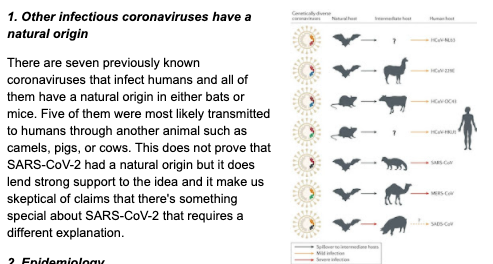
1/ Cargo Cult:
First, it is interesting to note that some of these experts happily follow a kind of cargo cult whereby sampling left and right on an industrial scale and tweaking viruses will get you to eco-health nirvana.. 
all achieved by bringing science to dark corners of the world, educating local populations, fighting bad local habits and the like. (Wait, did I read that somewhere else?)
And so one can go sample in some caves in these 'wild' places, occasionally with minimal PPEs, and bring..
all the samples back to urban civilisation (a city of 11mln will do nicely) so as to save the world and the heathens.
To be clear focussing on wildlife farming and wildlife trades for instance makes a lot of sense and should be done...
but not crawling in caves w/o proper PPE before catching a plane/train back to the comfort of a big city.
Anyway that was my take of the cargo cult.
Other scientists likely have a political axis to grind, careers to preserve, grants to protect, doctoring students to recommend..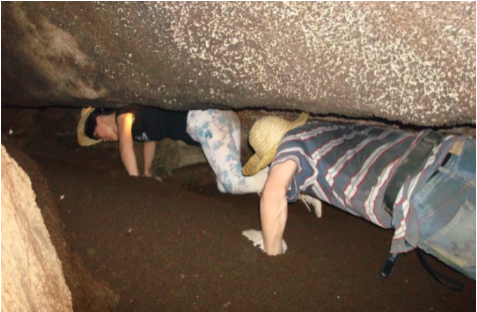
2/ False generalisation:
Stiil, at the end of the day the main argument of this crowd is 'zoonosis happens all the time - hence a zoonosis is much more likely for SARS-S CoV-2'.
This fallacy is based on 3 false generalisations:
- temporal
- pathogene
- geographical

All these 3 generalisations totally underestimate the research-related accident risk factor. Surprise, surprise..
2.a/ Temporal fallacy:
I am glad to learn the Justinian and Black plagues were not due to lab leaks. But I am more interested in the last 20 years for some reason.
Since SARS-2 the numbers of P3s in China has gone from under 20 to about 112 (as of Aug 20, likely 120 today).
The number of labs working on coronaviruses has increased a lot, with a good chunk of the research done in Wuhan across at least 4 sites and 3 institutions (WIBP, WIV, Wuhan Uni, etc)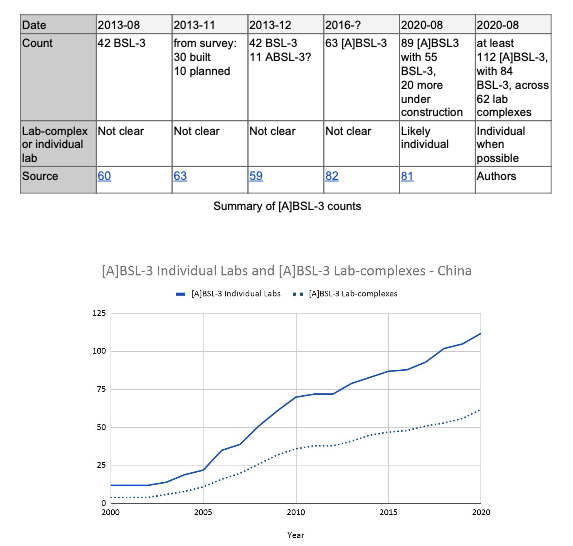
Over the last 18 years China managed to have 4 SARS primary-cases (2004) with one community outbreak - when it handled SARS1 without proper P3 discipline.
And the regularity of recent accidents with other pathogens is astonishing. Take brucellosis for instance.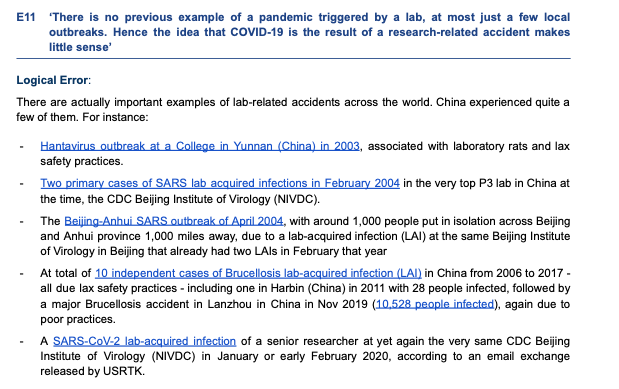
2.b/ Pathogen fallacy:
This one has a very old lineage, but basically it says that no research-related accident has ever caused a pandemic.
Specious logic.
First you have to ignore the 1977 Russian flu which did create a pandemic and is attributed to a research mishap.
Then you have to argue that the other documented research related outbreaks were not pandemic so don't count.
For sure for instance Brucellosis is not going to result in a pandemic - it's very rarely human to human transmissible - but what does it tell you about biosafety?
Imagine instead that a P2 or P3 lab was handling a virus with just the right set of characteristics - hardly seen up to then:
- infectious before displaying symptoms (not like SARS1)
- good proportion of asymptomatics
- extremely transmissible (airborne)
Basically SARS-CoV-2.
Then not only the risk of a research related accident increases (like SARS1), BUT the risk of a pandemic given a community outbreaks increases too (beyond SARS1) - and that is key:
The risk of pandemic increases in a compounded way ('risk accident' x 'risk pandemic / accident')
That some scientists can pretend otherwise, and stick to their false generalisation based on previous pathogens, show that they are either incompetent or trying to pull some wool over our eyes.
To make things worse the pathogen generalisation fallacy crosses with the temporal one as it is only in the last few years that research in Wuhan has focussed on the actively prodding the role of the FCS in making some BatCoV more targeted for humans.

That one is subtle but so common!
Basically it is likely true that for China as a whole the risk of zoonosis outbreak is higher than the risk of research-mediated outbreak.
But that is NOT true when an outbreak starts in Wuhan of all places.
There you need to look at risk factors that may explain the outbreak.
First the local risk factors. With ~4 Wuhan sites working on these coronaviruses the research related accident is an essential factor in the city.
For comparison, a China that had the same relative intensity for the research risk factor would need to have close to 500 P3 sites..
working on BatCoVs, because with its (at least) 4 sites Wuhan has only 0.7% of China population.
Now imagine that: 500 lab sites working on BatCoVs: Is that negligible compared to a zoonotic jump?
Do you still think the research risk factor is secondary?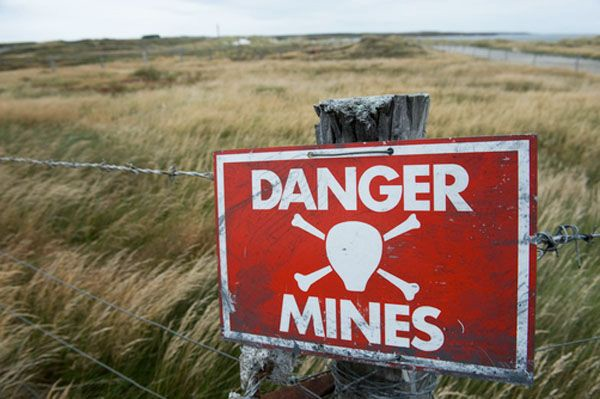
Then you need to look at non local risk factors affecting Wuhan.
There it is pretty clear that a zoonosis started silently in a part of China (or abroad) could trigger a first outbreak in Wuhan. Distance is no issue in a well connected world.
However the problem is not the distance but the exclusivity. There are 100+ Chinese cities with wet markets and transport hubs.
Let's say that the risk of a zoonotic BatCoV outbreak in China (and neighbouring countries) is maybe 1 every 10 years..
First, most will still lead to a relatively local outbreak, (as may have happened with the jump to human in Guangdong province with SARS1), not a distant one.
Then the remaining ones that lead to a distance outbreak will not target Wuhan specifically - it's one of many cities.
Suppose that 1/2 of the zoonotic outbreaks remain local, and that there are (only!) 15 cities in China connected like Wuhan to these zoonotic risk hotspots.
That results in 1 chance every 300 years of such a non-local zoonosis starting an outbreak in Wuhan (of all place).
Basically (10 * 2 * 15).
Hence the **local** risk factors favour a research related accident for an outbreak that first started in Wuhan, and the spillover risk from **distant** hotspots does not change that.
The only way that the distant zoonosis spillover factor can..
contribute more is if you have **largely exclusive** wildlife trade links with Wuhan.
For instance some farm somewhere in a BatCoV hotspot producing mostly for Wuhan and a few other cities.
Now this is still plausible and that should be the object of research.
But we cannot turn it into a given just to improve the odds of a zoonosis.
So based on logic and probabilities, and on what is known - not what is wished - the research-related accident IS simply the best hypothesis that explains an outbreak in Wuhan (of all places).